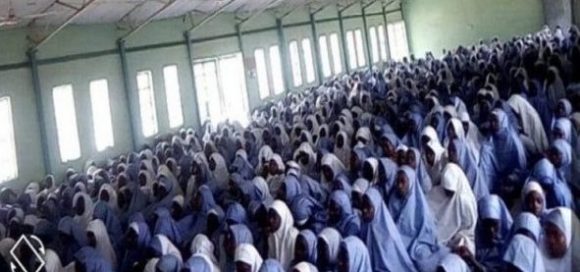Politics
DAPCHI GIRLS: Army says new memo cited as further proof of its culpability misinterpreted

The Nigerian Army Tuesday reacted to a newly-published memo being cited as documentary proof of its culpability in the abduction of the 110 Dapchi schoolgirls, following earlier emergence of information about its withdrawal from the town before the attack.
The memo was a Defence Intelligence Agency alert to the military about possible Boko Haram attacks in Borno and Yobe States before insurgents stormed the school.
The Army said the memo, published by Sahara Reporters on Tuesday afternoon, was an attempt to drive a narrative that the military was negligent in its counterterrorism efforts which consequently resulted in the successful attack on Dapchi, Yobe State, by Boko Haram on February 19.
The February 6 memo, signed by Brigadier-General Emmanuel Aladeniyi, warned of impending attacks, especially suicide bombing, in public places, such as the University of Maiduguri, markets, mosques and parks.
It also said that Boko Haram was plotting an abduction of 17 citizens for suicide missions and a separate mass abduction of citizens for other deadly missions such as the use of Personnel-Borne Improvised Explosive Device (PBIED) or Vehicle-Borne Improvised Explosive Device (VBIED) “using especially Golf cars with registration numbers from states of the North.”
Reacting however, Onyema Nwachukwu, spokesperson for the Nigerian Army in the counterterrorism operation, said, “It is very crystal clear” that the memo “does not corroborate the argument and narrative Sahara Reporters is attempting to sell to the public.
”For one, the memo was a general warning about possible Boko Haram activities in Maiduguri and Damaturu, Borno and Yobe capitals, respectively, and did not include any specific or even general reference to Dapchi or facilities within it.
Read also: DAPCHI GIRLS: Stop this blame game, Dogara tells Army, Police
“The content reflects general intelligence alert, to which we cannot conveniently situate the attack on Dapchi, one of the several towns in Yobe State”.
Nwachukwu added that the date on the memo was February 6, 2018, nearly a month after the troops had been moved from Dapchi to Kanama, about 125 kilometres North-East of Dapchi on Nigeria’s border with Niger. The troops he reiterated were moved to Kanama on a reinforcement after Nigerian soldiers came under heavy firepower there.
“As at the time of that redeployment, there was no imminent threat on Dapchi,” he said. “Rather, the threat was on Kanama where the insurgents were carrying out attacks along the Nigerian-Nigerien border”, he said.
Nwachukwu’s statement reaffirms an earlier statement which included information that the Nigerian Army 159 Task Force Battalion was moved from Dapchi to Kanama on January 10, exactly 40 days before the invasion of the girls’ school in Dapchi on February 19.
RipplesNigeria… without borders, without fears
Click here to join the Ripples Nigeria WhatsApp group for latest updates.
Join the conversation
Support Ripples Nigeria, hold up solutions journalism
Balanced, fearless journalism driven by data comes at huge financial costs.
As a media platform, we hold leadership accountable and will not trade the right to press freedom and free speech for a piece of cake.
If you like what we do, and are ready to uphold solutions journalism, kindly donate to the Ripples Nigeria cause.
Your support would help to ensure that citizens and institutions continue to have free access to credible and reliable information for societal development.
























